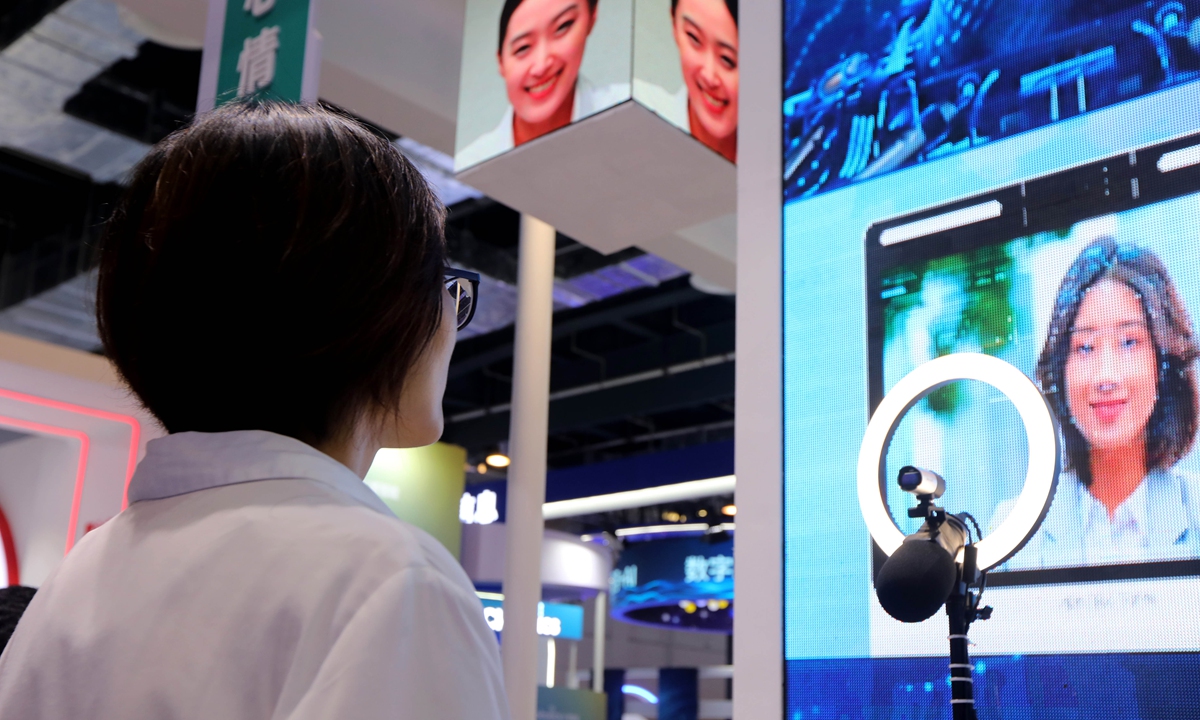Chinese firms showcase breakthroughs in key technologies at global AI conference in Shanghai

Vsitors experience artificial intelligence that detects and interprets human emotional signals at 2021 WAIC in Shanghai on Wednesday. Photo: Chen Xia/GT
The development of China's artificial intelligence (AI) is gaining momentum despite increasingly fierce global competition and the US' relentless push for "tech decoupling," with domestic tech firms showcasing various breakthroughs in key technologies at the World Artificial Intelligence Conference (WAIC) which kicked off in Shanghai on Thursday.
Business insiders and experts said China has a long way to go to achieve high-tech self-reliance but they expressed firm confidence in the country's capability of attaining the goal on the back of policy support, industrial and supply chain coordination and continuous opening-up.
On Thursday, a multitude of people gathered to interact with the large language models which are the most popular attraction in this year's event. NetEase Youdao unveiled an interactive English language learning chatbot at the event, which allows speakers to practice spoken English with the AI model.
Chinese tech firm Meituan launched the 4.0 version of its unmanned aircraft system at the event. Compared with the previous editions, it has longer delivery range and better performance operating in inclement weather environment.
In terms of semiconductors, a number of domestic chip companies including Enflame, Vastai Technologies and Hexaflake unveiled their cutting-edge AI chips, which enable large language models to process vast amounts of data at lightning speed.
"Recently, we have surpassed US chip giant Nvidia's high-end chips in a single benchmark for image recognition on the international stage. This achievement is a result of a step-by-step process," a sales representative surnamed Wang from a startup AI company told the Global Times on Thursday.
Compared with Nvidia, we follow a different technological path to enhance performance by optimizing algorithms and reducing computational load, Wang said.
The process of achieving self-reliance in science and technology has helped Chinese high-tech enterprises to forge their core competitiveness, and enabled them to become an essential part in the global innovative industrial chain.
According to 2022 Global AI Innovation Index Report released at the WAIC, China ranks second in Global AI Innovation Index for the third straight year in 2022, as it has been accelerating efforts in expanding its talent pool, building data infrastructure and making technological breakthroughs.
Despite some Western media hyping about the conference having lost the shine among the US giants, this year's WAIC however saw the participation of a record number of companies, according to the Xinhua News Agency.
Focused on high-tech sectors including large models, chips, robots, and intelligent driving, the global event attracted more than 400 exhibitors and over 50 outstanding startups, with more than 30 cutting-edge products debuted for the first time. The organizer also said that the exhibition area totaled more than 50,000 meters. The number for participating companies and the venue area are at their highest levels since 2018, when the annual event was inaugurated, according to Xinhua.
While adhering to self-reliant innovation, China has been actively promoting scientific and technological sharing and exchanges, aiming to contribute to global sci-tech development for the benefit of all mankind.
In a sign of sound exchanges between Chinese and US business communities despite the Biden administration's mounting "decoupling" pressure, a number of high-profile US multinationals including Google and Tesla also showcased their AI-powered products and services at the WAIC.
In a video speech delivered to the opening ceremony of the event, Tesla CEO Elon Musk lauded China's advance in the field. "I think, really, China is going to be great at anything it puts its mind into. That includes many different sectors - sectors of the economy, but also artificial intelligence," he said.
Xiang Ligang, director general of the Beijing-based Information Consumption Alliance, told the Global Times, "It has become a consensus among the domestic tech industry that they will strive for achieving self-reliance in high technologies whatever measures the US take."
While US Treasury Secretary Janet Yellen's visit to China following a visit by US Secretary of State Antony Blinken to Beijing sends a positive sign of stabilizing China-US relations, there is no sign of any relaxation in the US' containment of China.
On June 27, US media reported that the US Commerce Department will stop the shipments of AI chips made by Nvidia and other chip companies to customers in China as early as July. Amid the US pressure to cut China off from key chipmaking tools, the Netherlands last Friday announced new export controls on advanced semiconductor equipment.
"The US has abused export control measures, continues to mount crackdown on China's semiconductor sector and purposely decouple the global chip market. The US' actions harm global free trade, while ignoring international trade rules and trample on fair competition principle," Shu Jueting, spokesperson for China's Ministry of Commerce, said at a regular press briefing on Thursday.
The semiconductor industry is a typical example of global division and China is the world's largest semiconductor market whose chip sales account for around one-third of the global total, Shu said, noting that this is a result of win-win cooperation between Chinese enterprises and those from other countries.
"The US' moves harm not only the legitimate rights and interests of Chinese companies but also the interests of many other countries and regions, and hinder global sci-tech exchanges and economic and trade cooperation," Shu said, noting that they will backfire.
"Over the past five years, I strongly felt growing demand for domestic replacements, strengthened coordination between upstream and downstream companies as well as growing importance the authorities and investors attached to the high-tech sector. I believe Chinese chips will be able to compete with those made in the US one day," Wang said.
"The US' actions will eventually come back to haunt itself, as its relentless containment of China - one of the world's most vibrant markets and one of the major sources of US firms' revenues - will hurt its own intellectual property prowess and its global competitiveness in cutting edge technologies," Xiang said.
The US' two-faced foreign policy of seeking macro-economic policy coordination with China to solve the US' own financial and economic problems while retraining from win-win cooperation with China will not yield any result the US side wants, he said, noting that it's the best choice for the US to conduct trade and tech cooperation with China.
Photos
Related Stories
- Record number of companies attend global AI conference in Shanghai
- China tech startup launches humanoid robot at Shanghai AI event
- Shanghai to host major artificial intelligence event in July
- Dialogue in birthplace of Confucius pools wisdom for AI governance
- Chinese colleges face head-on with AI-generated research papers
- AI Vibes: Courageous young girl pursues her dreams despite disability
- AI Vibes: The courage of firefighters, a young man’s resilience, and a father's Love
- Surging demand in AI industry creates job opportunities for Chinese graduates
- Cooperation key to speed up tech breakthroughs
- China accelerates AI application to real economy
Copyright © 2023 People's Daily Online. All Rights Reserved.









